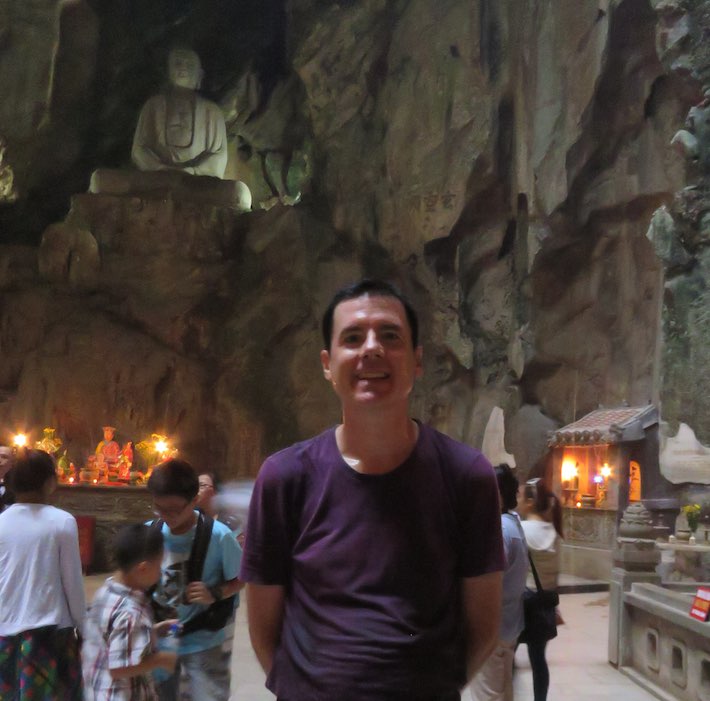This month the ASQ Influential Voices is taking a bit different approach. This month we are looking at applying quality tools in our personal life based on the post from other influential voice, Sunil Kaushik: How Lean Helped Me Travel To Egypt With Just $500.
Sunil is on a nomadic trip around the world to learn and enjoy the experience while also helping others applying lean thinking.
I just returned from my own nomadic adventure.

John Hunter, in a cave at Marble Mountain, Da nang, Vietnam. This is one of my last stops before returning home. See more of my travel photos
I have experience applying quality tools since I was a kid being guided by my father. Another influential voices author, that I met in Hong Kong when I presented a a Deming seminar, included a mention of that connection in his post: Quality Life and Succession.
In this blog I write about using management improvement thinking in my personal life. That extends from management concepts such as optimizing the entire system and not getting trapped by habit or convention, for example in: The Aim Should be the Best Life – Not Work v. Life Balance.
My father applied these ideas in our family life and so naturally they formed my way of thinking. At the core was a focus on experimentation and focusing on what was important. It is easy to spend a lot of time on things that really are not that important and questioning if the actions we are taking is really what we should be doing based on the most important aims was a natural part of how we thought growing up. In order to experiment effectively you need to be able to understand data and draw appropriate conclusions (post on an experience with my father as a child: Playing Dice and Children’s Numeracy).
Also we would look at what wasn’t giving the results we desired and experiment on how to improve. I include in “results” the happiness or frustration the process causes (so as a kid this was often the frustration my brother and I had in doing some task we didn’t want to do – cleaning our room, doing homework etc. and the frustration our parents felt at having to continually bring us back onto task). Much of this effort amount to setting the understanding and incentives and process to get better results (both the end results and increasing happiness and reducing frustration of all of us in the family).
A concept I use a good deal in my personal thinking on a more concrete level is mistake proofing (or at least mistake making less easy). Many people do this, without really thinking that is what they are doing. But by thinking of it consciously I find it helps you design processes to be most effective.
That also helps you explain the reasoning to others. My mother visited me when I was in Malaysia and as we were hiking in Fraser’s Hill, Malaysia the trail was fairly challenging. I was able to explain that it is helpful to consider your strategy based on reducing risk (using a strategy that if things went wrong you minimized risk – so lean in a way that if you slip you fall toward the trail not down a big slope and consider a couple steps ahead so you know what you will do if your momentum takes you faster than you thought or you slip of whatever).
On that same hike we also used a grip for me to help her climb up that I learned from her as a kid that again is largely about mistake making more difficult. In a similar situation many people will grab hands and pull each other up, but a safer grip is really to have your hand grip their forearm and their hand grip your forearm.
I use the concept of mistake making less easy all the time in my personal life. It often is a very small thing but over time it is a natural way to act and reducing problems you have to deal with. A simple example is 2 or 3 times many years ago (probably over the course of a couple years) I pushed a elevator button and mildly hyperextended my finger or thumb (not causing any damage or real pain just a momentary shock of that isn’t suppose to happen). Now if I was smart I would have fixed the process the first time but it took me a couple of instances to think of a better process. So now I just always push with my knuckle which eliminated that potential error (it probably also is a bit more hygienic the process provides another advantage).
Related: Touring Factories on Vacation When I Was Young – Positivity and Joy in Work – Egypt Photo Essay by John Hunter – Data Can’t Lie



I enjoyed reading this post. I’m currently in my last semester of an EMBA program, and although throughout the program, I’ve been thinking about how to apply or translate the things I’m learning to the work I do in the nonprofit world, I have not thought as systematically about applying them to my daily life. As it happens, though, this semester also coincides with what I’ll euphemistically call a major household reorganization project, so it provides me an opportunity to rethink the way my house is set up and the way I organize my time away from work. I imagine I’ll spend some more time exploring your blog and looking for other ideas to consider or apply.
Pingback: June Roundup: Using Quality Tools In Everday Life | A View from the Q